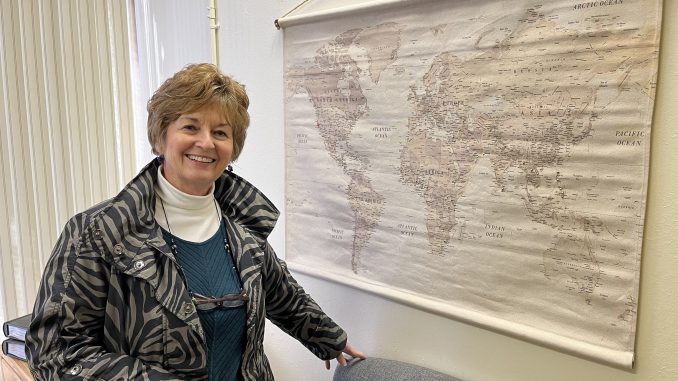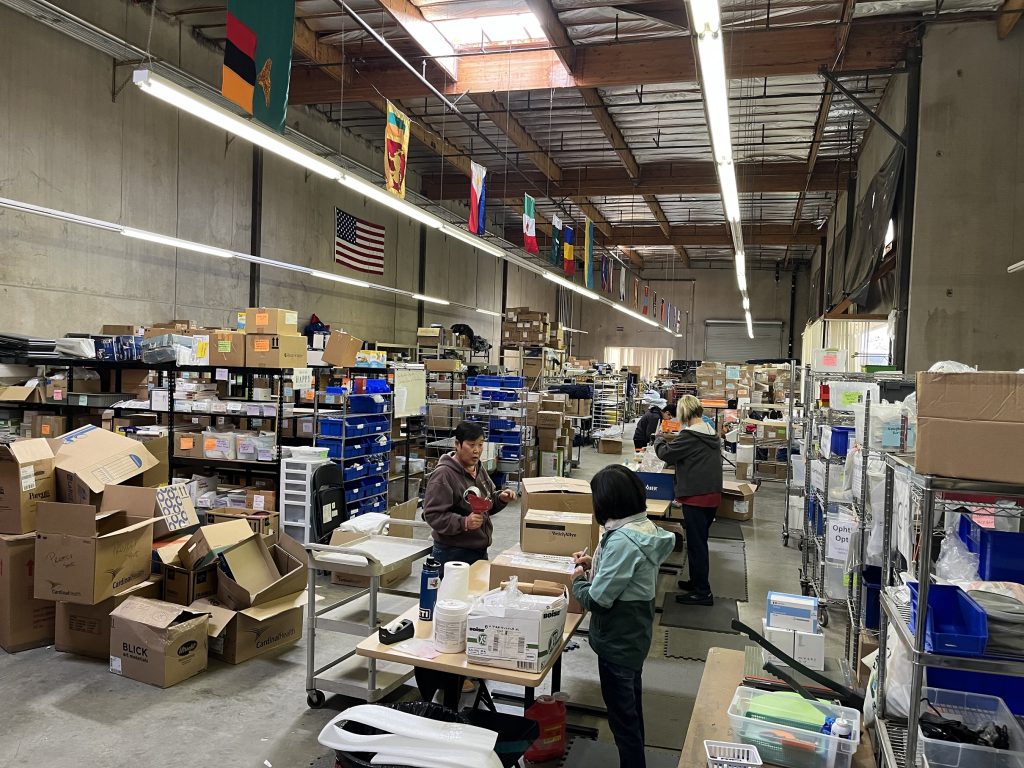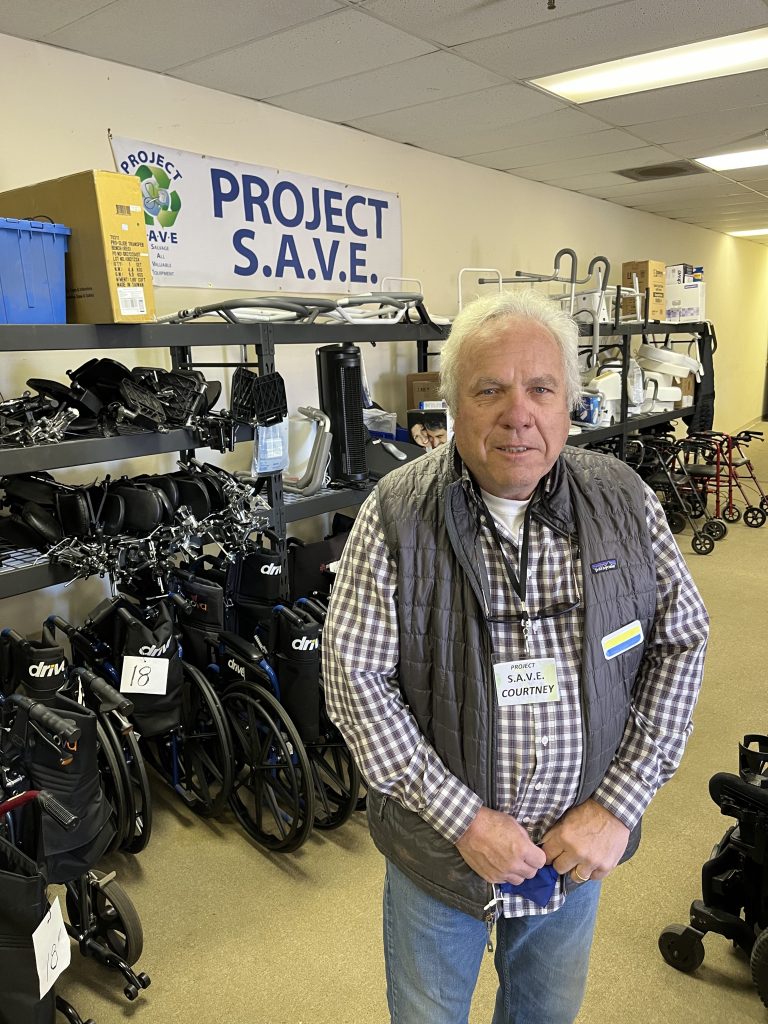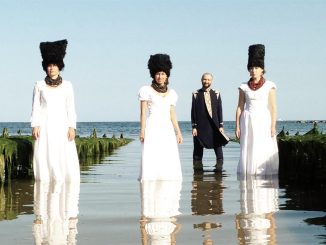
A few pieces of clothing; family pictures; important documents. A reality of living in Northern California, especially in recent years, is that most residents have a mental list of what to grab in case of fire. Some take that preparation a sagely step further, keeping a “bug-out bag” filled with necessities and, perhaps, a few items with priceless sentimental value, ready to go at all times.
But what about those with health challenges, whose daily routines—and sometimes, even survival—depend on expensive, often hard-to-procure medical equipment?
“When wildfires hit, people just flee for their lives,” said Janice Walker, director of Chico Project S.A.V.E. “They leave behind CPAP machines, oxygen concentrators, hospital beds, walkers, even their hearing aids.
Project S.A.V.E. (Salvage All Valuable Equipment) is a nonprofit group that collects and distributes recycled medical supplies and equipment; these are donation-based, and the organization often supplies the items to individuals who, for financial and insurance-related reasons, might otherwise go without.
Walker said Project S.A.V.E. was “flooded” with dire requests for help after the Camp Fire—not only from fire victims, but from medical and relief service providers. “Hospitals ran out of oxygen concentrators; we gave to Red Cross, to FEMA, to all of the care facilities,” she said during a recent visit to the organization’s north Chico headquarters. “We were able to help a lot of precious people who had nothing at the time.”
During a tour of the Project S.A.V.E.’s facilities—at the old Koret building near the Chico Regional Airport—Walker detailed how the organization is a lifeline for people during times of crisis and in fulfilling every day needs, from the streets of Chico to war-struck Ukraine.
Mission control
Project S.A.V.E.’s reception area/distribution room is a flurry of activity each Tuesday morning, when the organization is open to the public. There is often a rush of clients when the doors open at 9 a.m.; people claiming, donating or delivering equipment continue to trickle in until they close at noon. There are at least a dozen volunteers—including nurses, a respiratory therapist and other medical professionals—on site assisting visitors, repairing used equipment, sorting supplies and packing some to be shipped overseas.

During a recent visit, an aged volunteer showed an elderly client how to operate the brakes on a walker he’d come to collect. “That’s where you put your beer,” the volunteer joked, pointing to a drink holder. Another patient, leaving with CPAP machine (currently in critically short supply, due to a June 2021 recall), thanked another volunteer, saying, “You’re literally saving my life.”
Maya Honeyman, an occupational therapist with Enloe HomeCare, scanned lines of walkers, wheelchairs, portable toilets and other equipment.
“This place, it’s amazing,” she said. “We come and get stuff for our clients, they come and get stuff for themselves, it’s great for people who can’t afford equipment.
“We ask people what they need, and if insurance doesn’t cover it or they can’t pay for it we come pick it up and get it to them,” Honeyman continued, saying she and her colleagues regularly refer patients to Project S.A.V.E. “It’s an incredible service.”
Locally, the organization distributes supplies to individuals, facilities in need and health care and service providers (including homeless and housing groups such as the Chico Housing Action Team, aka CHAT). Walker mentioned another crisis in which Project S.A.V.E. greatly assisted the North State: the COVID pandemic.
“We gave out over 250,000 masks, including 56,000 to Enloe alone,” she said. “We gave them to dentists’ offices, doctors’ offices, nail salons—wherever requests came from. We had a bunch given to us during the Ebola crisis, so we had an abundance of masks, protective gowns, gloves, things they couldn’t get but we were fortunate to already have.”
Walker has headed up the organization since 2004; her husband, David, a retired physician who worked at Enloe for two decades, is an adviser and dedicated volunteer.
Until last February, the project’s physical home for the previous 18 years was four storage units on Highway 32. “We’ve grown so much and the move was fantastic,” she said. “This has given us an office, a bathroom, and kept us inside out of the rain and heat.”
Walker said the nonprofit relies on cash donations for overhead on their office and warehouse space at the Koret building, shipping costs and other necessities. Some equipment is donated by medical facilities, supply manufacturers and care providers, but the bulk come from private parties.
“A lot of times, someone will pass away, and someone gives us their equipment,” she said. “We distribute it to whoever needs it; we just tell them to return it when they don’t need it anymore.”
Donations for these items are accepted, but rarely required. Exceptions are mobilized wheelchairs and scooters, which can
cost several thousand dollars—Walker said Project S.A.V.E. can provide them to those in need for $150 to $500.
Beyond borders
In Walker’s office, she has a map with gold pins indicating 48 countries to which the organization has sent shipping containers filled with life-saving materials. She said she’s yet to add the latest two recipients—Poland and Ukraine.

Project S.A.V.E. partnered with a Redding-based organization called Shasta For Ukraine last year to provide necessities to the besieged nation, sending four filled 40-foot storage containers since August. Walker said her group has contributed much-needed “soft consumables” (sutures, bandages, wound care supplies), crutches, wheelchairs, gurneys and hospital beds. The latest shipment, which was being prepared during the CN&R’s visit, included an X-ray machine. The Redding group contributed generators, warm clothing, tools and more.
Project S.A.V.E.’s international efforts are part of the group’s foundation; it was started in 1996 by Dr. Phyllis Cullen and the Men’s Auxiliary of Enloe Volunteers to outfit doctors on missions to other countries.
The tour of the building included a stop in the repair room, where volunteer Dick Roberts was fitting a newly sewn nylon utility pack onto a walker. (“I fix things here,” he said, adding, “Sometimes they even work afterward.”) Beyond that is the warehouse, a huge room where about a half-dozen more volunteers—all nurses, Walker noted—sorted and organized all manner of medical supplies. In the shipping area sat several pallets bound for Ukraine and another batch of supplies Walker said will accompany a group of Chico State nursing students to the Kristina Chesterman Memorial Clinic in Ozu Abam, Nigeria—founded in memory of the local university student killed by a drunk driver in 2013.
Back near the main entrance, Courtney Casey—a Project S.A.V.E. volunteer for five years and long-time board member of the The Arc of Butte County—wore a badge with the colors of the Ukranian flag and a lanyard reading “Captain Safety.”
“I watch people make mistakes,” he quipped regarding the title, before more somberly extolling the organization’s virtues.
“Where else can you just show up and walk out the door a few minutes later with something you desperately need?” he asked. “And it’s a locally grown, mom-and-pop nonprofit, not part of a huge organization.
“Just look at how far they’ve shipped things. Look at all the lives they’ve saved.”
Project S.A.V.E.
Open to public (for pick up and donations): Tuesdays, 9 a.m.-12 p.m.
(530) 680-5974
1100 Marauder Street
facebook.com/ProjectSAVE
chicoprojectsave.org




my mom has lung cancer she’s takeing chemo and radiation now. and she’s needs a hospital bed matress . she only has a thin foam pad now. any help would be greatly appreciated. Thank you have a blessed day.
we need a hospital bed mattress. thank you.
This mission showcases how generosity can transform lives. It’s so encouraging to see such dedication. Thanks for sharing.